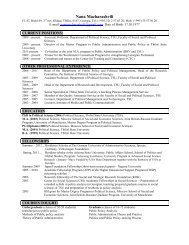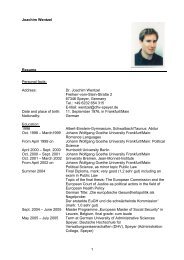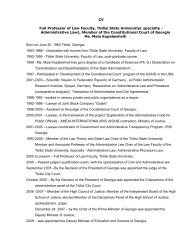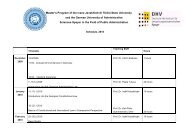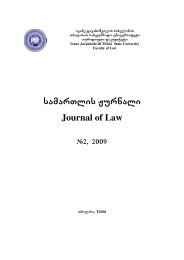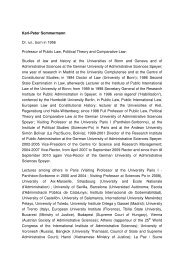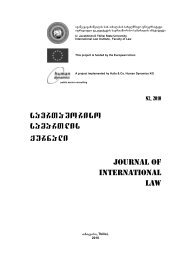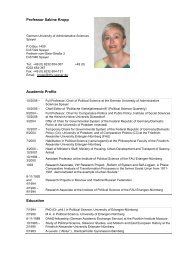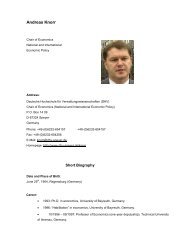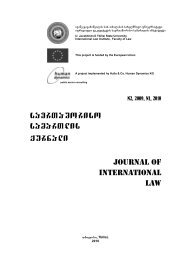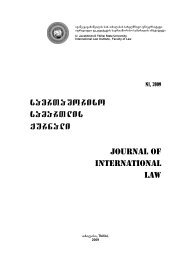Untitled
Untitled
Untitled
You also want an ePaper? Increase the reach of your titles
YUMPU automatically turns print PDFs into web optimized ePapers that Google loves.
saerTaSoriso samarTlis Jurnali, #1, 2008 JOURNAL OF INTERNATIONAL LAW, N1, 2008<br />
though that exercising universal jurisdiction may<br />
not be considered to be widely supported.<br />
Development of relatively recent notion of<br />
humanitarian intervention 62 is interesting for<br />
the purposes of this essay, as it serves as a<br />
tool of further erosion of a concept of sovereign<br />
immunity for the sake of dealing with the<br />
mass human rights atrocities in any given state<br />
after all other legal and political means have<br />
proven to be inefficient. This new concept is<br />
considered to be emerging due to the very<br />
fact that international crimes so severely violate<br />
essential human rights that it is not permissible<br />
for the international community not<br />
to intervene, even by using force and thus<br />
punish the perpetrators. Consequently a<br />
question emerges: if humanitarian intervention<br />
may be justified to protect human rights,<br />
what is so unacceptable in recognizing universal<br />
jurisdiction over international crimes and<br />
instead of letting causing even more devastating<br />
results for the general population of any<br />
given country, leaders of which might be implicated<br />
in committing international crimes, to<br />
subject these leaders to universal jurisdiction<br />
and bring them to justice in any state physically<br />
capable to do so The benefits of such<br />
change in practice seem to be the following: a<br />
criminal leader receives deserved punishment,<br />
prosecution is targeted and instead of involving<br />
risk to lives of groups, already victimized<br />
by policies or conducts of criminal leaders only<br />
those “deserving” are hold to account. In this<br />
case prosecution is targeted and victims can<br />
see that justice is served, whereas by exercising<br />
humanitarian intervention even more innocent<br />
people become victims along with those<br />
groups that might already have been victims of<br />
perpetrators.<br />
Therefore, the question remains: if humanitarian<br />
intervention can be tolerated in particularly<br />
exceptional situations, when the scale and<br />
character of perpetration is extremely abhorrent,<br />
why can not the prosecution of those<br />
protected by immunities for perpetration of<br />
international crimes by courts of other states<br />
be considered as not infringing sovereign equality<br />
of states and thus, make it possible to strip<br />
off immunities from those deserving so due to<br />
their activities, notwithstanding their rank<br />
If there is a risk of political misuse and if<br />
states need more assurance of impartiality<br />
than this can be guaranteed by a national<br />
court of any given state, the Security Council<br />
of the United Nations may be entrusted to make<br />
a decision over criminal leaders and situations<br />
they create and recognize them subjected to<br />
“universal jurisdiction”, as their activities inflict<br />
gross human rights atrocities, causing “threat<br />
to international peace and security”.<br />
Whatever motivation behind and justification<br />
for humanitarian intervention, it may not<br />
be considered to be fitting any of the recognized<br />
concepts of jurisdiction. It can not be<br />
argued that by possibly developing this concept<br />
further and making it a rule of international<br />
law, even if used in very exceptional situations,<br />
it would cause less harm to state sovereignty<br />
than recognition of exercise of universal<br />
jurisdiction over international crimes, disregarding<br />
the status of the perpetrator. The<br />
development of international and human rights<br />
laws evidence the need for progressive development<br />
of universally recognized principles.<br />
Thus, a signal stemming from the emerging<br />
concept of humanitarian intervention, that<br />
mass human rights violations may serve as a<br />
good cause to disregard sovereign equality<br />
of states and intervene in seemingly “domestic”<br />
matters, may lead to a conclusion that at<br />
the current stage of development of the concept<br />
of human rights protection it may perfectly<br />
be possible to subject even the highest ranking<br />
perpetrators of international crimes to universal<br />
jurisdiction along with already existing<br />
possibilities of prosecution, including the prosecution<br />
according to the “complementarity”<br />
principle 63 of the International Criminal Court 64 .<br />
Therefore, the conclusion follows: if there<br />
is a real political will and devotion to the protection<br />
of human beings from atrocities, constituting<br />
international crimes, there will be a<br />
possibility to find way out from a maze of protection<br />
of sovereign immunity and sovereign<br />
equality notions and bring perpetrators of international<br />
crimes to justice as deserved, to<br />
serve the interests of justice, to work as deterrent<br />
for future atrocities and to give survived<br />
victims at least a bit of hope of the future.<br />
V. AFTER ALL THE ABOVE DISCUSSED, WHAT DID<br />
COURT RULE IN THE PINOCHET CASE<br />
Due to the limited format of the essay, the<br />
content of the case 65 will not be considered in<br />
details: a limited discussion of the case will<br />
suffice for the purposes of the essay. The<br />
case has been selected due to the following<br />
72



